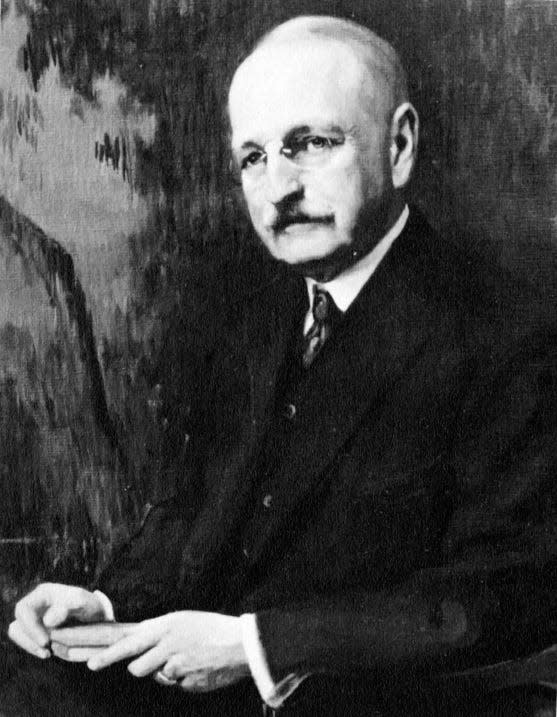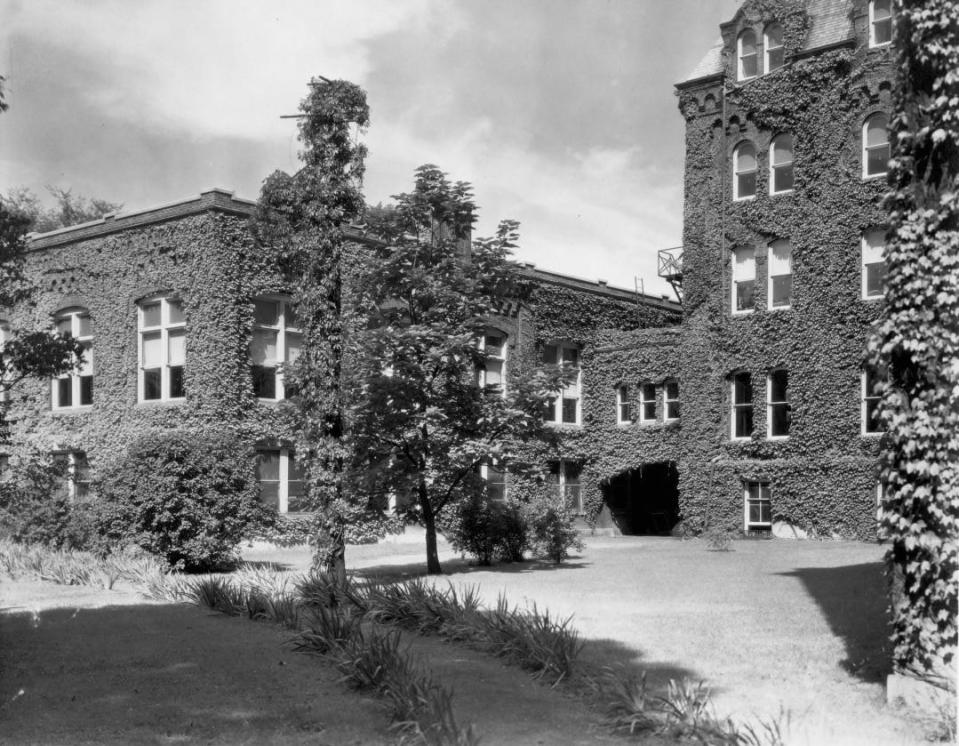Elmira's Fassett was a businessman, DA, state senator, congressman and almost VP candidate
- Oops!Something went wrong.Please try again later.
- Oops!Something went wrong.Please try again later.
- Oops!Something went wrong.Please try again later.
- Oops!Something went wrong.Please try again later.
He might have been president of the United States. There is a building named in his honor on the Elmira College campus. He presented a gold watch to the Emperor of Korea.
He served as Chemung County district attorney, collector of the Port of New York, state senator and a member of the House of Representatives, and ran for governor of New York.
Known as the “Father of Golf” in Elmira, he also published the Elmira Advertiser. At his funeral he was called “Elmira’s most distinguished son.”
Jacob Sloat Fassett (Nov. 13, 1853-April 21, 1924) was indeed a remarkable man.

His daughter, Jeanie Fassett Learned, speaking to the Elmira Rotary Club on Oct. 15, 1952, spoke of his early years when he did chores driving the family cow to pasture from his home at 460 W. Church St. in the early morning and then home at dusk. According to her, he “carried a slate to school and learned the 3 R’s thoroughly. He went to church and he learned whole passages of Scripture. He never forgot them and often quoted them later in his speeches.”
Fassett graduated from Elmira Free Academy and worked his way through the University of Rochester, graduating with honors in 1875. He then studied law in his father’s law office. He was admitted to the bar in 1878 and, one year later, at the age of 26, was appointed Chemung County district attorney by Gov. Lucius Robinson (an Elmiran) to fill a vacancy. He served a year and then went to Heidelberg, Germany to study law and political economy.
Fassett’s political career got fully underway with his election to the New York State Senate in 1883, a position he held for eight years. At this point, he became part of the New York State Republican political machine put together by “Boss” Thomas C. Platt, of Owego. He also became a rival of Democrat David Bennett Hill, of Elmira. Hill would become governor and owner of the Elmira Gazette. Fassett would become owner and editor of the Elmira Advertiser.
In the Legislature, Fassett chaired the Committee on Commerce and Navigation, and he was also chair of the Committee on Insurance. He served on the Committee on Cities, among others.
When Hill became governor, Fassett waged an aggressive campaign on corruption in his administration and, according to his daughter, “unearthed notorious evidence of corruption in the Departments of New York City.” He also developed a rivalry with Theodore Roosevelt.
In 1891, President Benjamin Harrison appointed Fassett collector of the Port of New York. In his short time there, he impounded the yacht of William Vanderbilt and raised a bit of a stir. The New York Republican Party nominated Fassett for governor in 1891, which resulted in his leaving the position of collector. He ran against Roswell Flower, losing by 40,000 votes.
Fassett married Jennie Crocker in 1879. She was from California and met her future husband while visiting a friend who was attending Elmira College. He was district attorney at the time.
The couple would acquire the 60-acre Strathmont property and build a beautiful home. Their daughter described it in the Star-Gazette in 1958 as “a paradise for children … it contained a secret staircase, a large attic that was frightening to youngsters, a nine-hole golf course (designed after Fassett’s trip to Scotland in the early 1890’s, earning him the title “Father of Golf” in Elmira) and a “monster” in the cellar that hummed — the dynamo that supplied electricity to the estate.”
Jennie Fassett was a force in her own right. Her husband wrote to the president of Elmira College in 1916, “The newspapers & Mrs. Fassett tell me that we have made some promise about a new Dining Hall. I don’t know what the details are as I haven’t been consulted. But whatever Mrs. Fassett says or has said will be law and gospel so far as I am concerned. Personally I do not like the name 'Fassett Commons.' It would be far better 'Crocker Hall.'"

Fassett and his father had been trustees of Elmira College. In 1917, Fassett donated $30,000 for the construction of Fassett Commons. In 1925, after J. Sloat’s death, Jennie Fassett would donate $60,000 to “finance and equip” a reading room memorial in the college library, according to the Elmira College Weekly.
In Fassett’s letter to the college president, he also offered to donate his estate to the college: “The present college plant is nearly worn out … Isn’t there a feasible way to guarantee the growth for all time of Elmira College by the use of this real estate?"
Politics continued to play an important role in the life of J. Sloat Fassett. His association with Boss Platt became strained because of his reform inclinations. Learned, his daughter, noted that her father had been promised the vice presidential nomination in the election of 1900 with William McKinley. In copies of letters I obtained from the Yale University Library Manuscripts and Archives between Platt and Fassett, it would appear the nomination was in play. She indicated that at some point, friction with Platt led to the nomination of Theodore Roosevelt instead. Some historians would suggest that perhaps Platt was more interested in getting rid of Teddy as governor by bumping him upstairs.
Newspaper headlines in October 1905 noted that “Political leaders sign agreement against bribery.” Fassett, as chair of the Republican County Committee, and Democratic Chair W.H. Lovell signed this agreement, known as the Elmira Compact. They promised that “no expenditure of money or promise of money … for the purpose of purchasing or influencing votes” would be allowed. They also agreed to pursue the arrest and prosecution of those who engaged in bribery at the polls.
Fassett was a very successful businessman. He had a gold mining concession in Korea, a ranch in New Mexico. He was president of the Insular Lumber Co. in the Philippines. He was also president of the Fassett Lumber Co. in what is now Fassett, Quebec; the municipality was named after the company. He served as vice president of the Second National Bank in Elmira.
Learned referred to her father and his partner Leigh Hunt as the “fathers of modern mining in the Far East.” In 1899, they went to Korea to inspect the mines and meet the emperor. Fassett and Hunt presented a “magnificent” gold watch to the emperor, “who was a nice old man … he seemed charmed and the next day he sent presents to us." Learned reported that her mother and Mrs. Hunt worked on “backing out of the room.”
More Elmira history:The McCann family were prominent figures in history of Elmira Heights and Chemung County
More Elmira history:The Elmira Armory: Tragedy during its construction, a collapse near the end
More:Pudgie's Pizza founder Charles Cleary dies at 82: 'He always had a sparkle in his eyes'
Fassett served three terms in the U.S. House of Representatives from 1905-1911. He died in Vancouver, British Columbia on April 21, 1924, while returning from a business trip to Japan and the Philippines.
An interesting aspect of the Fassett’s life in Elmira was their interest in the problems of the city. They were especially interested in children’s problems. In her speech to the Rotary, Learned told this story: “When their sons were growing up, there were no public playgrounds, even in the schools. School and neighborhood football and baseball teams were battered from vacant lot to vacant lot and usually forbidden to return. Father had the area along Hoffman Street from the entrance to Strathmont (now Fassett Road) to Washington Avenue cleared, and a gridiron and baseball diamond and a tennis court made. He built a comfortable little clubhouse which became the headquarters of the amateur Athletic Club, best known for its football team. Some fine games were played between such teams as the Toddyville Skippers, the Dirty Dozen, the Patch Hustlers, the Pickaways, Froghollow Pets, Pigeon Point Stars, and scores of other teams whose members grew up to bless Sloat Fassett for his interest in boys less fortunate than his own.”
In 1908, the Federation Building opened on the site where the Steele Memorial Library now stands. Former County Historian Tom Byrne noted that it was a “project that lighted the way to today’s United Community Services ...” Fassett donated the site, and Jennie Fassett gave $15,000 to the $60,000 structure. At its opening, she said the objective was to provide “such material help as will put them (the needy) on their feet, and make them self-supporting.”
In "Chemung County New York History 1890-1975," Byrne wrote that the building “was among the outstanding structures of its kind in the nation.”
Jim Hare is a former history teacher and mayor of the City of Elmira. His column appears monthly in the Star-Gazette.
This article originally appeared on Elmira Star-Gazette: Elmira history: Fassett lived amazing life in business and politics

